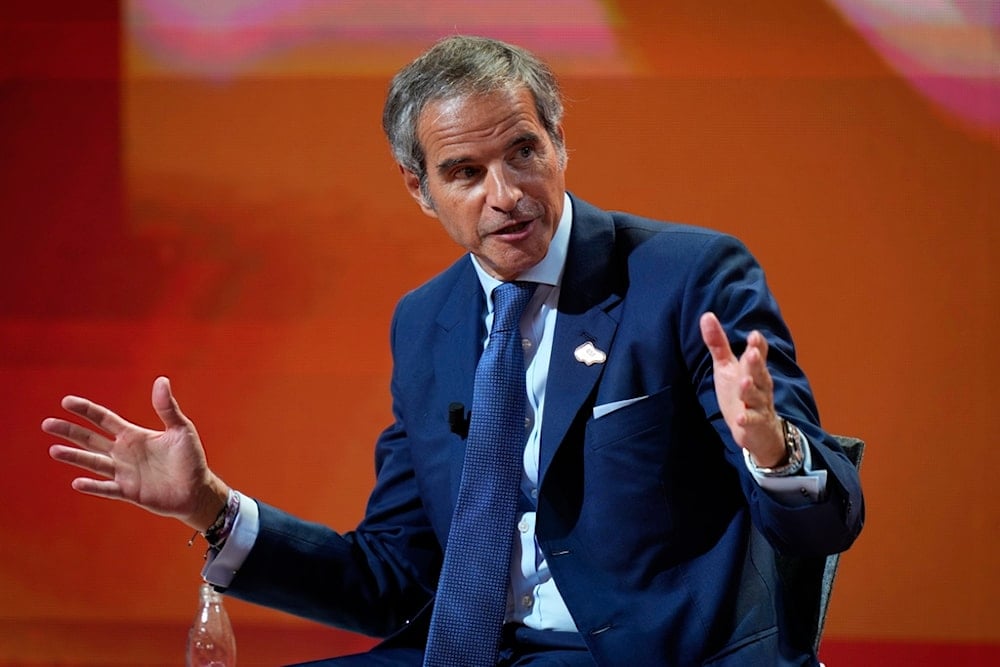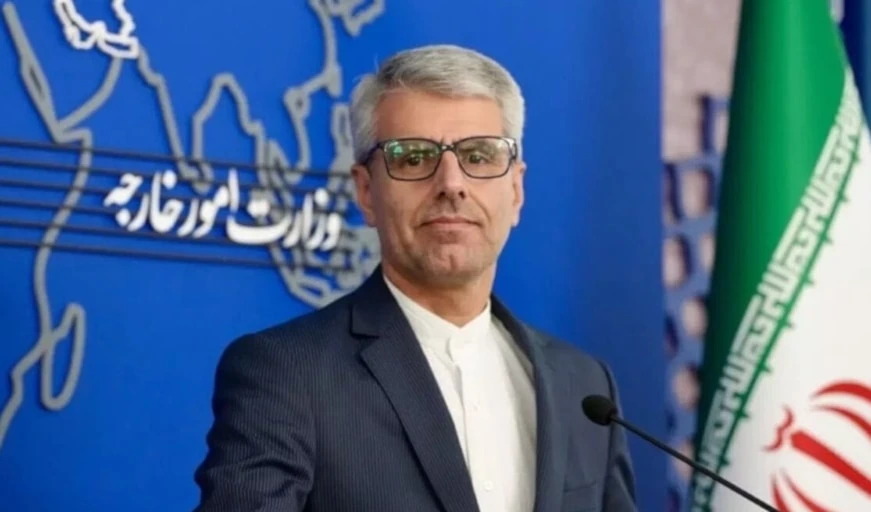IAEA’s Grossi hopes Iran inspection talks could reach deal within days
Grossi has told the IAEA board that Iran’s NPT safeguards remain binding, stressing that full compliance is vital to improving the nuclear standoff.
-

International Atomic Energy Agency (IAEA) Director General Rafael Grossi speaks during the annual Bled Strategic Forum gathering in Bled, Slovenia, Monday, Sept. 1, 2025. (AP)
The head of the UN nuclear watchdog said on Monday that negotiations with Iran on restoring full inspections have advanced, but time is running short to reach an agreement.
Addressing the International Atomic Energy Agency’s (IAEA) 35-nation Board of Governors in Vienna, Director General Rafael Grossi said, “Progress has been made. It is my sincere hope that within the next few days it will be possible to come to a successful conclusion of these discussions… There is still time, but not much, but always enough when there is good faith and a clear sense of responsibility.”
Today at the @IAEAorg Board of Governors, I reported on our ongoing efforts to promote nuclear safety, security and safeguards across a complex global landscape.
— Rafael Mariano Grossi (@rafaelmgrossi) September 8, 2025
In Iran, we’ve held weeks of technical discussions in Vienna and Tehran to agree on practical steps that would allow… pic.twitter.com/934OOkMfi7
Grossi emphasized that despite Iran’s recent legislation curbing cooperation with the Agency, Tehran’s obligations under the Nuclear Non-Proliferation Treaty’s Comprehensive Safeguards Agreement (CSA) remain fully binding. The CSA, he noted, is “the sole legally binding treaty governing the rights and obligations of the Agency and Iran with respect to safeguards implementation in Iran.”
He confirmed that weeks of technical talks in both Tehran and Vienna have focused on “practical steps” to facilitate verification under the CSA, while stressing the Agency’s readiness to take into account Iran’s concerns and proposals, provided they remain consistent with existing safeguards.
“The full implementation of the rights and obligations of the Agency and Iran under Iran's NPT Safeguards Agreement is indispensable to paving the way towards real improvement in the overall situation,” Grossi said.
Baghaei says Iran still weighing NPT exit, steps taken 'most minimal'
Earlier on Monday, Foreign Ministry spokesperson Esmaeil Baghaei said Iran has not yet made a definitive decision on whether to withdraw from the Nuclear Non-Proliferation Treaty (NPT).
At his weekly press briefing, Baghaei reaffirmed Iran’s current stance, noting that the country “remains a member of the NPT and committed to the safeguards agreement.” He clarified that while the idea of withdrawal “has been raised in parliament at a limited level,” no binding decision has been made.
Baghaei also criticized the international community for its silence on "Israel’s" nuclear capabilities. “This is a fact. This regime is the only obstacle to the realization of a West Asian region free of weapons of mass destruction, and it is the only regime in the region that is not a member of the Non-Proliferation Treaty,” he said.
He added that "Israel is also a dangerous entity that commits genocide and occupies the territory of two countries, and is a serious and immediate threat to global peace and security.”
Iran’s parliament submits emergency bill to withdraw from NPT
Following the announcement by the E3 (France, Germany, and the United Kingdom) to trigger the snapback mechanism on sanctions against Tehran, Iran’s Parliament has drafted and submitted an emergency bill on August 29 proposing a full withdrawal from the Nuclear Non-Proliferation Treaty (NPT).
At the time, Hossein-Ali Haji-Deligani, Deputy Chairman of the Article 90 Committee of Iran’s Parliament, confirmed that the bill will be uploaded to the parliamentary system on the following day and subsequently reviewed in an open session.
“As we had previously stated, these countries were already implementing the consequences of the snapback mechanism, including sanctions against us. There is nothing new in this.” Haji-Deligani told Iran's Tasnim.
Steps taken so far 'the most minimal'
He further stated that the steps taken were “the most minimal response by Parliament to the recent action of the European countries, and further regret-inducing measures are also on the agenda.”
The proposed legislation comes amid growing frustration in Tehran over the West’s repeated failure to honor agreements and ease pressure on Iran. Haji-Deligani noted that Iran’s Parliament is determined to pursue a firm and deterrent course of action.
According to the lawmaker, the activation of the snapback mechanism effectively reinstates previous sanctions but introduces no new developments. Nonetheless, he emphasized that Iran’s response would be strategic and assertive.
Criticizing continued dialogue with Western countries, Haji-Deligani asserted, “Given what these three countries have done, negotiations with them are now meaningless. Dialogue will only embolden them."
“We witnessed that during negotiations with the arrogant US, a brutal war was launched against our country by Israel, and the US bombed our peaceful nuclear sites,” he added. “Our people clearly know that talks with these countries have brought nothing but more pressure. Therefore, all dialogue must be suspended until these countries abandon their double standards.”
The emergency bill signals a potential turning point in Iran-E3 talks and highlights a significant policy shift in Tehran’s approach to its nuclear file. The move could impact the broader framework governing the Iranian nuclear program and regional diplomacy.

 5 Min Read
5 Min Read










